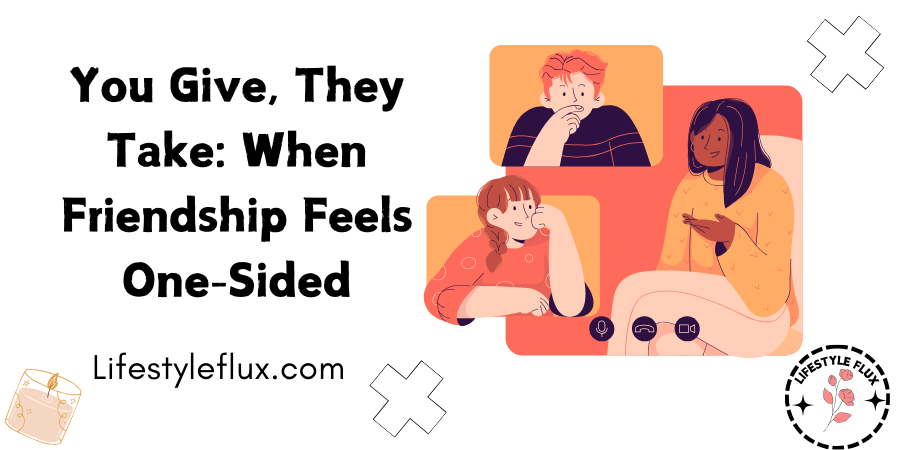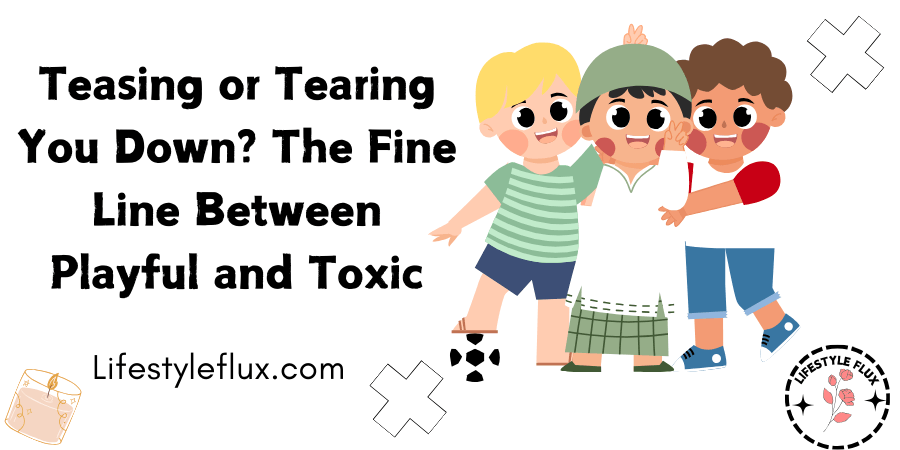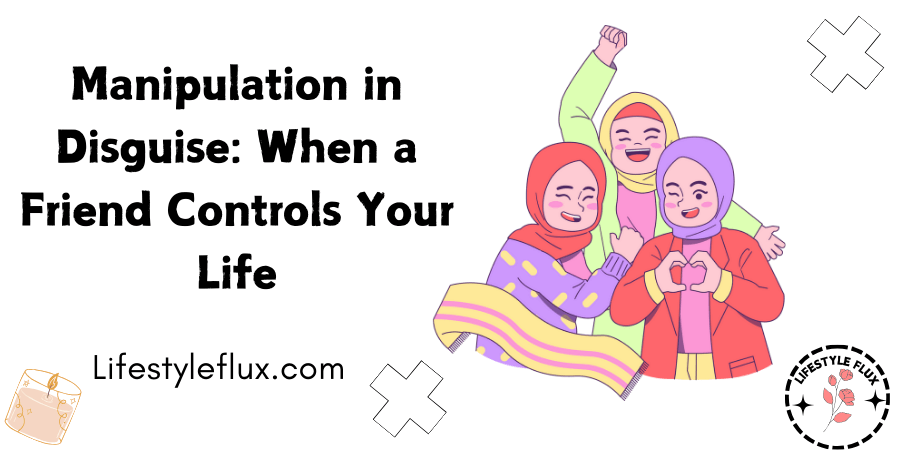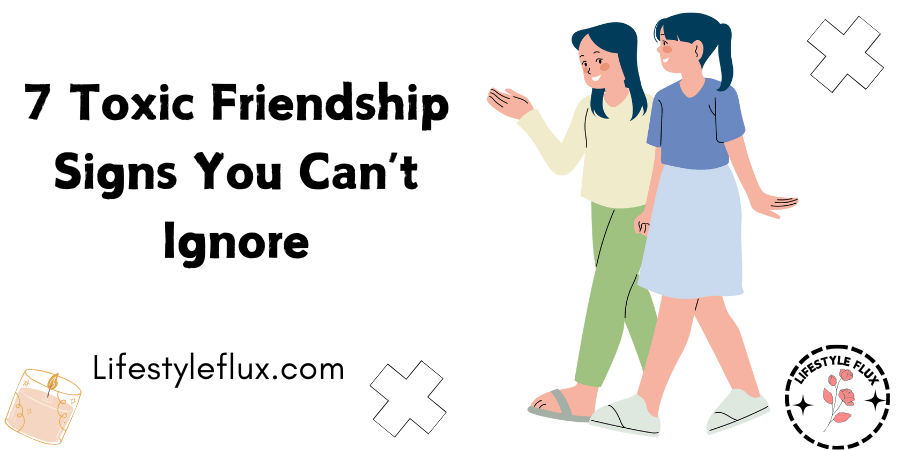Friendships are meant to uplift and support you, but what if they do the opposite? 7 Toxic Friendship Signs You Can’t Ignore will help you recognize when a friendship does more harm than good.
Toxic friends can drain your energy, manipulate your emotions, and make you feel undervalued—often without you even realizing it.
The worst part? These friendships don’t always start toxic; they can slowly evolve into one-sided, stressful relationships that leave you questioning your worth.
If you’ve ever felt like you’re giving more than you’re getting, it might be time to take a closer look at the people around you. Let’s uncover the subtle but damaging behaviors that could ruin your friendships.
Table of Contents
1. YOU GIVE, THEY TAKE
Friendships should be a give-and-take. You should listen as much as you talk and do favors as often as you ask for them. but what
if you’re doing all the giving and they’re doing all the taking.
Now, this is a classic example of an unbalanced or toxic friendship. One friend, who would be the giver, constantly makes an effort. The other, the taker, keeps asking for more.
So how does this kind of friendship develop? Well, more often than not, it starts with the taker. Takers tend to focus on themselves. They’re so concentrated on their needs that they forget to consider their friends.
But it’s more than just being selfish; these toxic friends don’t respect you as an individual. They don’t value your time or effort as much as their own.
In their mind, the friendship revolves entirely around them. Imagine your characters in a movie. Your friend thinks they’re the main character. They think the entire story is about them, which means you’re just a part of the supporting cast to them.

Unbalanced friendships like this never last. Givers almost always end up getting tired of the taker’s demands. The problem is that it can take years to realize that you must leave a friend behind.
If you suspect you’re stuck in an unbalanced friendship, we’ll try this: think about the last time you did something nice for your friend. Did you buy them lunch? Maybe you picked up some medicine for them when they were sick.
Now think about the last time your friend did something nice for you. If you can’t remember, then your friendship might be lopsided, so don’t wait to make a change.
Don’t let a toxic person rob you of your valuable time. You should never allow your friends to treat you like a caretaker. Instead, meet people who are willing to share the spotlight. That way, you can foster healthy friendships that will actually last.
2. TOO MUCH CRITICISM
Friends make fun of each other; some tease more than others, but no friendship is complete without some playful jabs. Teasing is a natural way to grow closer to someone.
In fact, it’s one of the best ways to show a friend that you trust them. Why? Well, you have to trust someone to know these comments aren’t meant to hurt you.
Let’s say a stranger insults your new haircut. How would you feel offended, insecure, maybe a little bit angry?
If a friend said that to you, the same insult would be funny and playful, but there is such a thing as too much criticism, even from a close friend.
Think about how you and your friends interact when you tease each other. What’s it like? What did they tease you about? Do they focus on small, superficial things or personal things like your goals and choices?

Does the teasing go back and forth, or is it just your friend criticizing you repeatedly? Toxic friends tease maliciously. They criticize important parts of your life, like your passions, insecurities, and relationships.
Friendly teasing should focus on tiny, pointless things. You tease a friend about their shoes or when they spilled food on themselves. And it’s also essential that teasing goes both ways.
Don’t let yourself become a punching bag. Unfortunately, it can be hard to tell someone’s true intentions. A friend might accidentally cross the line without trying to be toxic or vice versa.
The key is to pay attention to how it makes you feel. Despite teasing each other, friends should ultimately boost each other up. If their comments are crippling your confidence, well, then it’s time to take your friendship elsewhere.
3. LACK OF RESPECT
Toxic people don’t always hurt you or push you away. Some of the most toxic friends want you all to themselves. These friends can’t stand the idea of sharing with you.
They don’t like it when you spend time with other people. They’ll even lie to create conflict between you and your other friends. They’ll say things like hey, I heard him talking about you behind your back to destroy your other relationships.
Now, you might be wondering why anyone would want to do this. This kind of toxicity stems from deep-rooted insecurities. They feel jealous or abandoned when you have fun with other people.
They think you’ll like them less if you enjoy other people’s company. Those insecurities make them manipulative; they’ll start giving you guilt trips or try to speak for you.
But you can’t let toxic friends control you. It won’t be enough even if you cut ties with everyone in your life. Their insecurities will never disappear, so don’t cater to them.
No one should pull you away from your friends and family. If they respected you as a person, they’d let you have a personal life outside of them.

At the end of the day, that’s what comes down to a lack of respect. These friends don’t respect you, your friends, or your family. Ask yourself this: Have your friends ever gotten to know the people in your life, or are they constantly rude and distant?
This disrespect might extend even further, and you may notice them disrespecting your belongings. They’ll leave behind messes and treat your things like trash.
This usually means they don’t care about your feelings or are too self-centered to notice. Either way, you, your things, and the people in your life deserve respect. Don’t settle for anything less.
4. SHORT FUSE
There’s your friend who yells more than they talk. If they’ve got an especially short fuse, your friend might be displacing their anger onto you. Displacement is a psychological defense mechanism that helps us cope with anger.
Imagine you got an F on a paper. You’re obviously mad about it, but you can’t yell at your teacher, or you should. Instead, you transfer your anger elsewhere.
You take it out on siblings, pets, or, in this case, your friends. Unlike most items on this list, a short temper doesn’t mean the friendship is over. It’s toxic, but there are ways to fix it.
Start by trying to identify why your friend is so angry. Do they hate their job, or maybe they’re having money troubles? Next, let your friends know that you support them.
But only if they want to talk instead of yelling. This will do the trick in most cases, but there are exceptions. Some friends yell because they’re Petty and immature.
They can’t think of a more respectful way to handle conflict. But whether you like it or not, their anger will rub off on you. It can make you feel pessimistic, unmotivated, and flustered.
An angry friend can instantly ruin your whole day, so don’t let a toxic friend hold you back. Surround yourself with calm and happy people to keep your life moving in a positive direction.
5. NEVER TEXTING FIRST
Everyone communicates a little bit differently. Some talk to their friends daily, while others do it once or twice a month. So, how do you know if someone’s communication skills are actually toxic?
The important part isn’t how often you talk. It’s who started it. Look at your last four or five exchanges with your friend. Whether it’s texting, calling, or video chatting, who initiated it?
If it’s you every single time, well, then you might have a problem. Lack of initiation suggests that your friend doesn’t care about you as much as you care about them.
If they did, you wouldn’t be doing all the heavy lifting. Maintaining the friendship is not your job, so if you’ve initiated every conversation, stay silent and make them work for it. If they don’t, you’ll know they weren’t interested in being friends.
6. BACK AND FORTH
There’s your friendship, come and go, and waves. Are you really close for a few weeks and then suddenly start fighting all the time? Volatile friendships will weigh you down and bring all kinds of unnecessary stress and drama into your life.
But you shouldn’t have to wonder about the status of your friendship each day. Your friends should be a constant in your life, and you should be able to rely on them when needed.
Someone who’s combative or volatile can’t give you that consistent support. But the hardest thing about having this kind of friend is getting rid of them.
When you’re ready to cut them loose, they’ll return to being your best pal. They’ll be upbeat, fun, and supportive. You’ll stop fighting and go back to spending every second together.
You’ll convince yourself they’ve changed until it all falls apart again. So, if you’ve got a volatile friend, it’s up to you to break the cycle.
7. COMPETITIVENESS
When you share your accomplishments with your friends, what do they say. are they supportive and happy for you, or do they try to one-up you? Toxic friends can be extremely competitive.
They don’t want to admit it, but your success might make them feel inadequate. They’ll brag to cover up their insecurities because your approval matters to them. It may matter more than anyone’s.

This is actually a very natural feeling, and we want our friends to be proud of us. We want their acknowledgment that, in reality, your friend might admire you or find you intimidating.
They’re constantly competing to prove to you that they’re good enough. Now, of course, that isn’t always the case. Sometimes, toxic people develop superiority complexes around their friendships.
They only spend time with people they think they’re better than, and that way, they get an ego boost whenever you’re around. Imagine you’re insecure about your looks and might purposely hang out with people who aren’t good-looking.
This makes you seem better by comparison because you’re a good-looking friend, and that title will give you confidence. But this isn’t really friendship. It’s using your friends like pawns. You’re not valuing them as individuals.
So if your friend doesn’t want the best for you, spend your time with people who do.
Conclusion:
Recognizing a toxic friendship isn’t always easy, but ignoring the warning signs can take a serious toll on your mental and emotional well-being.
True friends uplift, support, and respect you—not leave you feeling drained, criticized, or undervalued. If you’ve identified any of these red flags in your own friendships, it’s time to set boundaries or walk away.
Letting go of a toxic connection isn’t a loss—it’s a step toward healthier, more fulfilling relationships. Surround yourself with genuinely caring people, and never settle for anything less.
Sources:
https://www.psychologytoday.com/us/blog/healthy-connections/201006/7-signs-youre-in-toxic-friendship
https://www.psychologytoday.com/us/blog/resolution-not-conflict/201603/8-signs-of-a-toxic-friendship
https://www.realsimple.com/work-life/family/relationships/toxic-friendship-signs
https://www.psychologytoday.com/us/blog/magnetic-partners/201301/toxic-friendships

Founder and CEO of Lifestyleflux.com, I bring years of expertise in self-improvement, wellness, and personal development to help you lead a happier, more balanced life. Through practical insights, eBooks, and consultations, I share actionable strategies rooted in experience and a passion for empowering others to unlock their full potential.

